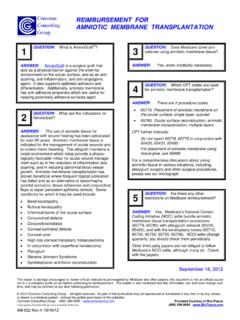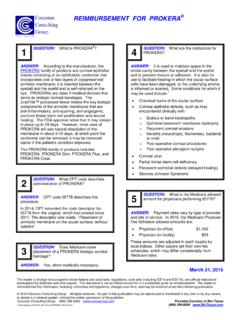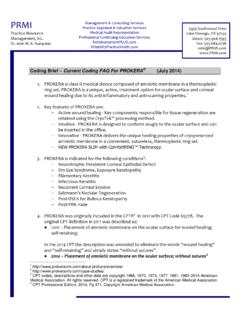Transcription of 3 4 2 ocular surface; single layer, sutured - Bio …
1 The reader is strongly encouraged to review federal and state laws, regulations, code sets (including ICD-9 and ICD-10), and official instructions promulgated by Medicare and other payers. This document is not an official source nor is it a complete guide on reimbursement . The reader is reminded that this information, including references and hyperlinks, changes over time, and may be incorrect at any time following publication. 2014 Corcoran Consulting Group. All rights reserved. No part of this publication may be reproduced or distributed in any form or by any means, or stored in a retrieval system, without the written permission of the publisher.
2 Corcoran Consulting Group (800) 399-6565 Provided Courtesy of Bio-Tissue S:\Monographs_FAQ\FAQ_Bio-Tissue (888) 296-8858 reimbursement FOR AMNIOTIC MEMBRANE TRANSPLANTATION 1 QUESTION: What is AmnioGraft ? ANSWER: AmnioGraft is a surgical graft that acts as a physical barrier against the external environment on the ocular surface, and as an anti-scarring, anti-inflammatory, and anti-angiogenic agent. It also supports epithelial adhesion and differentiation. Additionally, amniotic membrane has anti-adhesive properties which are useful for keeping potentially adhesive surfaces apart. 2 QUESTION: What are the indications for AmnioGraft?
3 ANSWER: The use of amniotic tissue for assistance with wound healing has been advocated for over 65 years. Amniotic membrane tissue is indicated for the management of ocular wounds and to control minor bleeding. The allograft maintains a moist environment which helps provide a physio-logically favorable milieu for ocular wound manage-ment such as in the reduction of inflammation and scarring, and in reducing abnormal blood vessel growth. Amniotic membrane transplantation has proven beneficial where frequent topical lubrication has failed and as an alternative to tarsorrhaphy, punctal occlusion, tissue adhesives and conjunctival flaps to repair persistent epithelial defects.
4 Some conditions for which it may be used include: Band keratopathy Bullous keratopathy Chemical burns of the ocular surface Conjunctival defects Conjunctivochalasis Corneal epithelial defects Corneal ulcer High-risk corneal transplant, trabeculectomy In conjunction with superficial keratectomy Pterygium Stevens-Johnson Syndrome Symblepharon and fornix reconstruction 3 QUESTION: Does Medicare cover procedures using amniotic membrane tissue? ANSWER: Yes, when medically necessary. 4 QUESTION: Which CPT codes are used for amniotic membrane transplantation? ANSWER: There are 2 procedure codes: 65779 Placement of amniotic membrane on the ocular surface; single layer, sutured 65780 ocular surface reconstruction; amniotic membrane transplantation; multiple layers CPT further instructs: Do not report 65778, 65779 in conjunction with 65430, 65435, 65480 For placement of amniotic membrane using tissue glue, use 66999 For a comprehensive discussion about using amniotic tissue in various situations, including pterygium surgery and other surgical procedures, please see our monograph.
5 5 QUESTION: Are there any other restrictions on Medicare reimbursement ? ANSWER: Yes. Medicare s National Correct Coding Initiative (NCCI) edits bundle amniotic membrane tissue transplantation procedures (65779, 65780) with pterygium removal (65420, 65426), and with the keratoplasty codes (65710, 65730, 65750, 65755, 65756). NCCI edits change quarterly; you should check them periodically. Other third party payers are not obliged to follow Medicare s NCCI edits, although many do. Check with the payers. March 31, 2014 The reader is strongly encouraged to review federal and state laws, regulations, code sets (including ICD-9 and ICD-10), and official instructions promulgated by Medicare and other payers.
6 This document is not an official source nor is it a complete guide on reimbursement . The reader is reminded that this information, including references and hyperlinks, changes over time, and may be incorrect at any time following publication. 2014 Corcoran Consulting Group. All rights reserved. No part of this publication may be reproduced or distributed in any form or by any means, or stored in a retrieval system, without the written permission of the publisher. Corcoran Consulting Group (800) 399-6565 Provided Courtesy of Bio-Tissue S:\Monographs_FAQ\FAQ_Bio-Tissue (888) 296-8858 reimbursement FOR AMNIOTIC MEMBRANE TRANSPLANTATION 6 QUESTION: Why does the use of tissue glue affect reimbursement ?
7 ANSWER: The FDA has not cleared tissue glue for use with amniotic membrane. The use of tissue glue in these cases is off-label and could be considered experimental or investigational. From a coding perspective, use of tissue glue with amniotic membrane is reported with a miscellaneous code, 66999. This code has no preset RVUs, has no specific postoperative period, has no reimbursement in an ASC and minimal reimbursement in a HOPD, and is subject to lengthy claims processing periods. 7 QUESTION: What are Medicare s allowed amounts for these procedures? ANSWER: Payment rates vary by provider and the site of service. 65779 65780 Physician (in office) $1,237 $921 Physician (in facility) $298 $921 ASC Facility Fee N/A1 $1,783 HOPD Facility Fee $1,193 $3,228 These amounts are adjusted in each area by local indices.
8 Other payers set their own fee schedules, which may differ considerably from Medicare rates. 1 The 2014 Medicare ASC fee schedule does not include a value for 65779. As a point of reference, value assigned in 2012 was $671. 8 QUESTION: Does Medicare pay for the supply of AmnioGraft separately? ANSWER: No, the supply is included in the provider reimbursement . HCPCS code V2790, Amniotic membrane for surgical reconstruction per procedure, is no longer eligible for discrete Medicare payment in any setting. The large discrepancy between the physician s reimbursement for 65779 in office vs.
9 In a facility addresses this the supply is part of the physician s allowance when the procedure is done in the office. When done in a facility, the supply is part of the facility fee. Note that there is no difference in the surgeon s allowable for 65780; this procedure is assumed by Medicare always to be performed in a facility. As with payment rates, other payers may have different policies regarding the supply of AmnioGraft. Check with your payers. March 31, 2014 The reader is strongly encouraged to review federal and state laws, regulations and official instructions promulgated by Medicare and other payers.
10 This document is not an official source nor is it a complete guide on all matters pertaining to reimbursement . The reader is also reminded that this information, including references and hyperlinks, can and does change over time, and may be incorrect at any time following publication. 2014 Corcoran Consulting Group. All rights reserved. No part of this publication may be reproduced or distributed in any form or by any means, or stored in a retrieval system, without the written permission of the publisher. Corcoran Consulting Group (800) 399-6565 S:\Monographs_FAQ\CPS_Pterygium CODING OPTIONS FOR AMNIOGRAFT USED IN PTERYGIUM INDICATIONS Examples of ICD-9 Diagnosis Codes for Pterygium Surgery ICD-9 Description ICD-9 Description Peripheral pterygium, progressive Recurrent pterygium Central pterygium Pseudopterygium Double pterygium 2014 Medicare reimbursement Summary 1 Code Description Surgeon In Office Surgeon In Facility ASC HOPD 65426 Excision or transposition of pterygium; with graft $ $ $ $1, 65780 ocular surface reconstruction, amniotic membrane transplantation.



